SERIIUS Technical Advisory Board

Dr. Joan Brennecke, Keating-Crawford Professor of Chemical and Biomolecular Engineering, University of Notre Dame
Director of Notre Dame's Energy Center, Brennecke is internationally known for her research in developing solvents, specifically supercritical fluids and ionic liquids. Her research interests include supercritical fluid (SCF) technology, ionic liquids (ILs), thermodynamics, environmentally benign chemical processing, and carbon dioxide separation, storage and usage. She has authored numerous groundbreaking articles on the use of SCFs and ILs, and her 1999 paper in the journal Nature launched a totally new area of molecular thermodynamics—one made up entirely of ions—to exploit ionic liquids. Her scientific papers in general are among the most highly cited in chemical engineering and physical chemistry. She received the 2001 Ipatieff Prize from the ACS in recognition of her high-pressure studies of the local structure of supercritical fluid solutions and the effect of this local structure on the rates of homogeneous reactions. Dr. Brennecke is a member of the National Academy of Engineering.
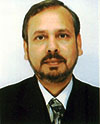 Dr. Gautam Biswas, J.C. Bose National Fellow and Professor, and Director, Central Mechanical Engineering Research Institute, Durgapur; formerly Department of Mechanical Engineering, IIT-Kanpur
Dr. Gautam Biswas, J.C. Bose National Fellow and Professor, and Director, Central Mechanical Engineering Research Institute, Durgapur; formerly Department of Mechanical Engineering, IIT-Kanpur
Dr. Biswas is a member of the Indian National Academy of Engineering (Fellow) and a Fellow of the Institution of Engineers-India. He is a Fellow of the American Society of Mechanical Engineers. Recently, he was elected a Fellow of the Indian National Academy of Sciences. He is an expert in the fields of computational fluid dynamics, convective heat transfer, turbulence, boiling heat transfer, and modeling of heat exchangers—with more than 200 publications in these technical fields. Dr. Biswas has many national awards and recognitions for his research and teaching. Dr. Biswas holds the Dr. Gurmurth and Veena M. Mehta Endowed Chair in Mechanical Engineering.
Dr. Viresh Dutta, Centre for Energy Studies, IIT-Delhi
Dr. Dutta earned his Ph. D. from the India Institute of Technology -Delhi in 1978. He joined the CES faculty in 1980 and became a professor in 2002. His research interests are in the areas of thin-film science and technology, solar photovoltaics, semiconductor nanoparticles, and embedded systems. He has expertise in different thin-film deposition processes and characterization techniques. He established microcomputer-controlled experiments in the Thin Film Laboratory (TFL), Department of Physics, IIT Delhi and he continues his active collaboration with the Laboratory. Capacitance-based techniques for evaluating amorphous silicon solar cells have also been established in TFL. He has worked extensively on cadmium telluride-based thin-film solar cells and transparent conducting oxides. He has established a spray-deposition facility for depositing semiconductor thin films. The facility has been used to develop the CdTe solar cell technology. Several novel ideas have been incorporated in the spray-deposition technique to achieve improvements in the film properties. Prof. Dutta has worked on tracking photovoltaic systems and studied the advantages of such systems. He has designed and fabricated a microcontroller-based, two-axis-tracking controller. He is also involved in the performance evaluation of large PV systems at IIT and other parts in the country. He and his collaborators in the Photovoltaic Laboratory in CES have worked on solar PV lighting systems and established the characterization technique for such systems. This technique is the standard method for evaluating PV lighting systems made by different manufacturers in the country. Work is currently under progress on PV inverters and maximum power-point tracker. His current research interests are in the area of use of nanocrystalline and nanotechnology-based materials for photo-electrochemical solar cells and organic solar cells.
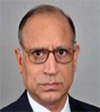 Dr. Ravi B. Grover is the founding director of the Homi Bhabha National Institute. Earlier, he concurrently held the position of the Director of the Department of Atomic Energy's Strategic Planning Group (SPG) and Director of the Knowledge Management Group at Bhabha Atomic Research Centre (BARC). He is a member of the World Nuclear University as a representative of the BARC training school. He is a fellow of the Indian National Academy of Engineering. He is currently the president of the Indian Society for heat and mass transfer. Dr. Grover completed his Bachelor's degree in Mechanical Engineering from the Delhi College of Engineering in 1970 and joined the staff of BARC. He completed a Ph.D. in mechanical engineering from the Indian Institute of Science, Bangalore, in 1982. During the first 25 years of his career, Dr. Grover worked in the areas of reactor thermal-hydraulics, safety, and process design of systems and equipment. During the past 10 years, he has been working on issues related to technology transfer, energy planning, extra-mural funding, and human resource development. Grover is well known in India as a proponent of nuclear energy. He is an editor of the International Journal of Nuclear Knowledge Management. Grover is one half of the Kakodkar-Grover duo who are chiefly responsible for the success of the Indo-US negotiations that culminated in the 123 agreement signed in July 2007. Anil Kakodkar and Ravi Grover were the technical advisors to India's political elite in the negotiations that led to the Indo-US nuclear agreement, a culmination of two years of painstaking negotiations.
Dr. Ravi B. Grover is the founding director of the Homi Bhabha National Institute. Earlier, he concurrently held the position of the Director of the Department of Atomic Energy's Strategic Planning Group (SPG) and Director of the Knowledge Management Group at Bhabha Atomic Research Centre (BARC). He is a member of the World Nuclear University as a representative of the BARC training school. He is a fellow of the Indian National Academy of Engineering. He is currently the president of the Indian Society for heat and mass transfer. Dr. Grover completed his Bachelor's degree in Mechanical Engineering from the Delhi College of Engineering in 1970 and joined the staff of BARC. He completed a Ph.D. in mechanical engineering from the Indian Institute of Science, Bangalore, in 1982. During the first 25 years of his career, Dr. Grover worked in the areas of reactor thermal-hydraulics, safety, and process design of systems and equipment. During the past 10 years, he has been working on issues related to technology transfer, energy planning, extra-mural funding, and human resource development. Grover is well known in India as a proponent of nuclear energy. He is an editor of the International Journal of Nuclear Knowledge Management. Grover is one half of the Kakodkar-Grover duo who are chiefly responsible for the success of the Indo-US negotiations that culminated in the 123 agreement signed in July 2007. Anil Kakodkar and Ravi Grover were the technical advisors to India's political elite in the negotiations that led to the Indo-US nuclear agreement, a culmination of two years of painstaking negotiations.
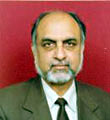 Dr. Vikram Kumar, Former Director, National Physical Laboratory, and Professor, IIT-Delhi.
Dr. Vikram Kumar, Former Director, National Physical Laboratory, and Professor, IIT-Delhi.
Prof. Vikram Kumar is internationally known in the area of semiconductor materials, characterization, and device technology. His early work on ultra-thin oxide MOS structures is cited widely. His extensive work toward the understanding of electronic defects and interface states in silicon, III-V, and II-VI semiconductors led to the prestigious Shanti Swarup Bhatnagar Award in 1992. As the Director of the Solid State Physics Laboratory, he has contributed toward the development of technology of materials and device, some of which reached production stage. His team developed the technology of 0.7 gate implanted MESFET and 0.5 pseudomorphic HEMT using MBE-grown strained layer AlGaAs/InGaAs/GaAs structures. He led the team for setting up the GaAs Enabling Technology Centre (GAETEC) foundry for pilot production of monolithic microwave integrated circuit (MMIC) that is supplying devices to various users, including those in defense and space. His team has also developed the technology for growth of single crystals of CdTe and GaAs and supplied device quality wafers. He also contributed to developing CdTe-based PV and PC infrared detectors. Kumar is a Fellow of the NASc, INAE, and IETE, in addition to being a member of several professional societies. Dr. Kumar has had extensive experience with PV materials and devices, physics of nanotechnology materials, and solar technology applications.
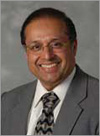 Dr. Ajeet Rohatgi, Regent's Professor, John H. Weitnauer, Jr. Chair, College of Engineering, Georgia Research Alliance Eminent Scholar, Director, University Center of Excellence for Photovoltaic Research and Education Electrical Energy, and Microelectronics/Microsystems, Georgia Institute of Technology.
Dr. Ajeet Rohatgi, Regent's Professor, John H. Weitnauer, Jr. Chair, College of Engineering, Georgia Research Alliance Eminent Scholar, Director, University Center of Excellence for Photovoltaic Research and Education Electrical Energy, and Microelectronics/Microsystems, Georgia Institute of Technology.
Dr. Rohatgi joined the ECE faculty at Georgia Tech in 1985 and started a program on photovoltaics, which has become one of the best in the country. He has become an internationally recognized leader in photovoltaics. He is the founding director of the first university-based DOE Center of Excellence in Photovoltaic Research and Education. He is the author of more than 300 publications and holds 10 U.S. patents. Dr. Rohatgi has received numerous awards and distinctions from professional societies and Georgia Tech. He is the founder and CTO for Suniva, a PV manufacturing company.
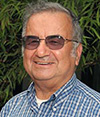 Dr. Roland Winston, Professor, School of Engineering, School of Natural Sciences, University of California, MERCED.
Dr. Roland Winston, Professor, School of Engineering, School of Natural Sciences, University of California, MERCED.
Winston is considered a pioneer in nonimaging optics, a science concerned with collecting, concentrating, transporting, and distributing light energy in applications such as solar energy, signal detection, illumination optics, and measurement and testing. He joined UC Merced as a founding faculty member in 2003. Winston's accomplishments in nonimaging optics include development of the technology behind a popular solar collector, the Winston Series CPC Collector, manufactured by Solargenix, Inc. BuildingGreen magazine recently honored The Winston Series CPC Collector as one of the Top 10 Green Building Products of 2004. As a distinguished physicist and one of the country's leading solar power experts, Winston came to UC Merced from the University of Chicago, where he has taught and conducted research for the past 39 years. For six years he chaired the Department of Physics.

